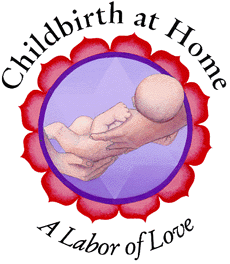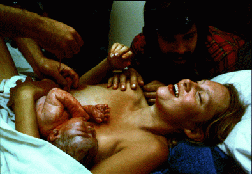
by Shelly Girard, L.M., C.P.M., M.P.H. and
Cordelia Satterfield Hanna, B.A.,C.C.E.,C.B.A.
| What Midwives Do | Why Choose a Midwife? | Why Choose Homebirth?
For Further Browsing: Childbirthing Options: Advantages and Disadvantages
Home birth and midwifery is not for everyone. Check credentials and get references for the midwife you choose. You have a responsibility to educate yourself and weigh out the advantages and disadvantages of the setting for birth--hospital, birth center or your own home. Know that there are risks involved in ALL birth settings--both in-hospital and out-of-hospital. In a hospital you are at greater risk for iatrogenic complications, and in a home birth, you will have less immediate access to emergency treatment. If you plan a homebirth, do not attempt to do it without a skilled birth attendant. Be certain that the midwife you choose is trained in emergency measures and will bring the appropriate medical equipment to your home to stabilize mother and baby until critical care can be obtained. Be certain you and your midwife have arranged for medical support in case a transport to the physician and hospital is required. Be prepared for all eventualities. There are no guarantees your birth or baby will be perfect. No birth is without risk. Learn all that you can, and make informed choices. Most of all, be prepared to take responsibility for the decision you make.
- Act as guardians of natural childbirth and well woman care providing birthing women with support and guidance to ensure a healthy pregnancy, labor and delivery with minimal intervention.

- Understand that pregnancy and birth are normal processes, and work to optimize the well-being of mothers and their babies as the foundation of caregiving.
- Approach the experience of childbirth as far more than a physical event, perceiving it as a profound emotional, mental and spiritual Rite of Passage for both mother and child.
- Respect the dignity, integrity and response-ability of the women they serve, recognizing that the primary caretaker and most important determinant of a healthy pregnancy and positive birth experience is the woman herself.
- Work in partnership with mothers, their families and their communities, helping them to explore their options and make informed decisions based on their unique circumstances.
- works as an autonomous practitioner, collaborating with a supervising physician and other health and social service providers whenever necessary, co-managing your care when needed. These may include medical doctors, psychotherapists, homeopathic practitioners, chiropractors, massage therapists, herbalists, oriental medical doctors, childbirth educators and doulas, hypnotherapists and others. [See Birth Support Providers Directory]

- Provides full prenatal care including a comprehensive medical history, physical exam, laboratory tests, and perinatal screening tests. With an emphasis on optimum wellness, she also provides in-depth counseling in the areas of nutrition, exercise, childbirth education and psycho-social issues.
- Facilitates the preparation of a birth plan and emergency back-up plan with physician and hospital, and visits your home before the birth. She will discuss the supplies you will need and familiarizes you with the items she brings: including oxygen, IV, suturing materials, drugs to control hemmorhage, and neonatal resuscitation equipment.
- Assist your labor, delivery and immediate postpartum, performs a complete newborn exam, administers newborn screening tests or preventative measures (as parents desire), helps establish breastfeeding, and remains at your home until mother, baby and family are resting comfortably. She recommends the baby be seen by a pediatrician within a week after the birth for a complete evaluation.
- Performs well mother and baby checks at home during the immediate postpartum period, and is available for phone consultation as needed. She will see you at two and six weeks postpartum and will offer counseling on appropriate family planning.
Giving birth naturally can be an experience of transformation and empowerment for everyone involved, and yet the intensity of the process can  be challenging for many women. The key to a healthy birth is the ability to relax, as it allows the spontaneous rhythms of labor to progress without interference. The greatest obstacle is fear, for it generates tension and resistance and makes coping with contractions more difficult. In general, the more relaxed the mother, the easier the birth. Mothers birth best where they feel the most comfortable.
be challenging for many women. The key to a healthy birth is the ability to relax, as it allows the spontaneous rhythms of labor to progress without interference. The greatest obstacle is fear, for it generates tension and resistance and makes coping with contractions more difficult. In general, the more relaxed the mother, the easier the birth. Mothers birth best where they feel the most comfortable.
For many healthy, low-risk mothers, home provides a supportive and safe environment in which to give birth. Moreover, when a newborn baby is perceived to be a conscious, cognizant being, the manner in which he/she is born can have a far reaching effects both psychologically and spiritually. In the privacy and sanctity of home, a mother can surround herself with those she loves and trusts. Assisted by capable, experienced practitioners, the family has more freedom to create the experience they desire and welcome their new child with love and dignity.
Advantages for Mother
- Childbirth has the potential to be a profound, life-transforming experience for the woman, one which may facilitate emotional healing, strengthen and deepen her relationships to all aspects of herself--with far reaching effects to her children, her mate and family members.
- She is not subjected to routine procedures such as continuos electronic fetal monitoring, IVs, "preps", stirrups and episiotomy.
- She can eat, drink, walk, and rest freely, working with her own natural body rhythms.
- She has continuous care with the same attendant throughout the prenatal, labor, delivery and postpartum periods, facilitating trust and competent decision-making based on process as an individual.
- She is more likely to deliver without drugs, vacuum extractors or cesarean section when supported by caregivers who feel that birth is a normal physiological function.
- The woman and baby have less risk of infection in her own home.
- She is free to explore a variety of creative birthing options such as waterbirth, birthing stools, delivery positions like squatting or hands and knees, and may utilize comfort measures like candles, incense, inspiring music, and aromatherapy.
- She is less likely to experience postpartum depression when she has not been separated from her baby. In addition, when childbirth takes place at home, it becomes an integral part of family life, with father and/or siblings able to participate in as complete and appropriate a manner as possible. This assists postpartum adjustment for all family members.

Advantages for Baby
- The baby's experience at birth can be made as gentle and loving as possible, and routine procedures such as deep suctioning, bright lights and artificial warming can be avoided unless medically necessary.
- The healthy baby remains with the mother, preserving the mother-infant bonding so crucial to the development of attachment parenting. [See Suggested Reading].
- The baby is more likely to be born vaginally without breathing difficulties so often associated with anesthetics and cesearean birth.
- Breastfeeding is easier to establish when the baby can nurse on demand, and the mother is given immediate encouragement and instruction in proper technique.
- Baby is less likely to develop an infection at home.

Disadvantages
- Requires a higher level of effort and responsibility on the part of the parents, and may not be supported by medical doctors/society. While midwives are trained in emergency measures, access to some critical care measures and equipment may be delayed, and transport to a hospital may be required. In urban areas, access to emergency medical services are expeditiously obtainable, but be certain the midwife you choose works in consultation and collaboration with an obstetrician who is willing to assume care of her patients if necessary. In a home birth, you will have less immediate access to emergency treatment, and there are no guarantees your birth and baby will be perfect. Be prepared to take responsibility for your decision to have a home birth.
Shelly Girard, L.M.,C.P.M., M.P.H. is a Licensed Midwife and Certified Professional Midwife with over 3 decades experience in body/mind medicine. She has a homebirth practice in Los Angeles, is a co- founder of The Wholistic Midwifery School of Southern California and earned her Masters in Public Health (MPH) in Health Education and Promotion from U.C.L.A. School of Public Health.
Cordelia Satterfield Hanna, B.A., C.C.E., C.B.A., is a Certified Childbirth Educator, Certified Birth Assistant, Assistant Midwife and Perinatal Health Educator who has been educating and supporting pregnant women and their partners in Los Angeles County since 1991. She is the co-founder of The Wholistic Midwifery School of Southern California and is a Masters in Public Health (MPH) Candidate at Loma Linda University School of Public Health.